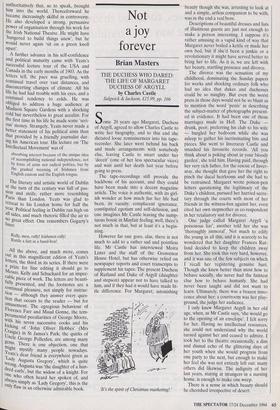Not a joy forever
Brian Masters
THE DUCHESS WHO DARED: THE LIFE OF MARGARET DUCHESS OF ARGYLL by Charles Castle Sidgwick & Jackson, £15.99, pp. 166 Some 20 years ago Margaret, Duchess of Argyll, agreed to allow Charles Castle to write her biography, and to this end she dictated loose reminiscences into his tape- recorder. She later went behind his back and made arrangements with somebody else, leaving Castle to smart under her `deceit' (one of her less spectacular vices) and wait until her death last year before going to press.
The tape-recordings still provide the backbone of his account, and they could have been made into a decent magazine article. The voice is authentic, with its girl- ish wonder at how much fun her life had been, its vacuity, complacent ignorance, constipated egotism and self-delusion, and one imagines Mr Castle leaving the sump- tuous house in Mayfair feeling, well, there's not much in that, but at least it's a begin- ning.
However far one goes, alas, there is not much to add to a rather sad and pointless life. Mr Castle has interviewed Moira Lister and the staff of the Grosvenor House Hotel, but has otherwise relied on newspaper reports and court transcripts to supplement his tapes. The present Duchess of Rutland and Duke of Argyll (daughter and stepson) appear not to have talked to him, and if they had it would have made lit- tle difference. For Margaret, astonishing Its the spirit of Christmas marketing!.' beauty though she was, arresting to look at and a simple, artless companion to be with, was in the end a real bore.
Descriptions of beautiful dresses and lists of illustrious guests are just not enough to make a person interesting. I suppose it's rather amusing in a vapid kind of way that Margaret never boiled a kettle or made her own bed, but if she'd been a junkie or a revolutionary it might have served better to bring her to life. As it is, we are left with her beauty, startling presence and divorce.
The divorce was the sensation of my childhood, dominating the Sunday papers for weeks and shocking ordinary folk who had no idea that dukes and duchesses could be so naughty. But even the worst press in those days would not be so blunt as to mention the word 'penis' in describing the subject-matter of photographs present- ed in evidence. It had been one of those marriages made in Hell. The Duke drunk, poor, preferring his club to his wife — burgled her bedroom while she was asleep to gather his incriminating bits and pieces. She went to Inveraray Castle and smashed his favourite records. 'All you think about is poking about in your bloody garden', she told him. Having paid, through her very rich father, for the rescue of Inver- aray, she thought that gave her the right to pinch the ducal heirlooms and she had to be restrained. Margaret wrote poison-pen letters questioning the legitimacy of the Duke's children, pursued her harried secre- tary through the courts with most of her friends in the witness-box against her, even cited her own stepmother as co-respondent in her retaliatory suit for divorce.
One judge called Margaret Argyll 'a poisonous liar', another told her she was `thoroughly immoral'. Not much to edify the young in all this, and it is scarcely to be wondered that her daughter Frances Rut- land decided to keep the children away from her. She took this very hard, however, and it was one of the few subjects on which I recall her registering genuine hurt. Though she knew better than most how to behave socially, she never had the faintest clue how to behave humanly. She had never been taught and did not want to learn. Ultimately, there was a brazen inno- cence about her; a courtroom was her play- ground, the judge her audience.
I only knew Margaret Argyll in her old age, when, as Mr Castle says, 'she would go to the opening of an envelope'. I felt sorry for her. Having no intellectual resources, she could not understand why the world turned against her and ceased to admire. I took her to the theatre occasionally, a dim and dismal echo of the glittering days of her youth when she would progress from one party to the next, but enough to make her feel she was not entirely left out: many others did likewise. The indignity of her last years, staring at strangers in a nursing home, is enough to make one weep.
There is a sense in which beauty should be cherished irrespective of desert.










































































































 Previous page
Previous page